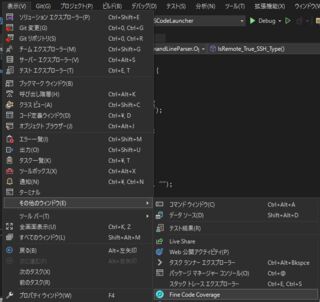投稿日:
TypeScriptやJavaScriptだとコマンド一発で見れるコードカバレッジだが、C#.NETの開発ではちょっと手こずったので導入方法を記録しておく。
確認環境
| Env | Ver |
|---|---|
| Visual Studio 2022 Community | Version 17.5.1 |
| .NET Framework | 6.0 |
導入手順
- C#.NETで開発用のプロジェクトを作成
- 作成したプロジェクトのソリューションにxUnitテストプロジェクトを追加
- 何かしらの実装と、それに対するテスト実装を作成
- Fine Code CoverageをVisual Studioにインストール
- ソリューションエクスプローラからxUnitテストプロジェクトを右クリックしてテストの実行
- 下部トレイにあるFine Code Coverageタブを選択
- コードカバレッジが表示される
疑問
Visual Studio 2022にもなって標準でコードカバレッジも取れないの?
今どきそんな事あるか?思って調べてみたところ、どうやらEnterpriseであればコードカバレッジを取る機能がついている模様。
まぁ無料版だから仕方ないねということで諦めるしかないでしょう。Professional版にもないけど…w。VisualStudioの便利機能は以前から有料機能に組み込まれる傾向があるので仕方がない気もしますが、取り敢えず今回は有志が便利なツールを作っていてくれて助かりました。
因みにコードカバレッジ自体は無料版でも取れます。ただこれはXMLのカバレッジレポートを吐くだけなので、可視化するには別途ここからHTMLを生成する必要があり面倒なので、なんかもっと楽な方法はないかなと思って見つけたのが今回のFine Code Coverageでした。
しかしFine Code Coverage便利なのにそこまで利用されているように見えないのは、やはりテストに関心がある人が少ないのか、公式にあるカバレッジHTMLを吐く方法で納得しているのか、その辺りが気になりました。自前でFine Code Coverageの様な物を作っている人もいるでしょうが、それは少数派だと思いますし。
この方法で取れるカバレッジは正しいものか?
GitHubのREADMEを読む限り、組み込みのカバレッジレポーターのAPIを叩いて取ってきたものを表示しているだけに見えるので、恐らく正しいデータが出ているのではないかと思います。
少なくとも単純なコードのUnit testingを書いた感じではテストケースを増減することでカバレッジも連動して増減していたのと、組み込みのレポーターがそのくらいはやってくれている筈で、これはその内容を表示しているだけなので恐らく大丈夫なのではないかと考えています。
投稿日:
本記事ではTypeScriptとSWC、Jestの組み合わせ環境でjest.spyOnを使う方法をexportパターン別に書いていきます。また、jest.spyOn対象の実装の詳細はテストせず、モック化したインターフェースのテストのみを行う前提で書いています。
確認環境
| Env | Ver |
|---|---|
| Node.js | 18.14.0 |
| typescript | 4.9.5 |
| @swc/cli | 0.1.62 |
| @swc/core | 1.3.36 |
| @swc/jest | 0.2.24 |
| jest | 29.4.3 |
サンプルコード
全編は以下にあります
jest.spyOn pattern example for SWC + TypeScript
親関数から子関数を呼び出すパターンで、子関数のjest.spyOnをするシチュエーションで考えます。
default export編
以下のdefaultエクスポートをjest.spyOnする方法です。
child.ts
export const child = (param: string) => {
return param;
};
parent.ts
import child from 'src/default/child';
const parent = (param: string) => {
return child(param);
};
export const Parent = {
parent,
};
parent.spec.ts
この形式の場合import側では書き換え不能なのでファイルごとモックにして解決します。
このやり方はファイルごとモックするため、同じファイルにある関数をjest.spyOnするのには向いていません。
import * as child from 'src/default/child';
import { Parent } from 'src/default/parent';
jest.mock('src/default/child');
describe('default', () => {
it('called by child function', () => {
const spiedChild = jest.spyOn(child, 'default');
Parent.parent('foo');
expect(spiedChild).toHaveBeenCalledWith('foo');
});
});
named export編
以下の名前付きエクスポートをjest.spyOnする方法です。
child.ts
export const child = (param: string) => {
return param;
};
parent.ts
import { child } from 'src/named-export/child';
export const parent = (param: string) => {
return child(param);
};
parent.spec.ts
default exportと同じくimport側では書き換え不能なのでファイルごとモックにして解決します。
このやり方はファイルごとモックするため、同じファイルにある関数をjest.spyOnするのには向いていません。
import * as child from 'src/named-export/child';
import { parent } from 'src/named-export/parent';
jest.mock('src/named-export/child');
describe('function', () => {
it('called by child function', () => {
const spiedChild = jest.spyOn(child, 'child');
parent('foo');
expect(spiedChild).toHaveBeenCalledWith('foo');
});
});
namespace export編
やり方はnamed export編と同じです。
child.ts
export namespace Child {
export const child = (param: string) => {
return param;
};
}
parent.ts
import { Child } from 'src/namespace/child';
export namespace Parent {
export const parent = (param: string) => {
return Child.child(param);
};
}
parent.spec.ts
namespaceの場合、トランスパイル後にクロージャになり、書き換え以前に関数にアクセスできなくなるため、ファイルごとモックにして解決します。
このやり方はファイルごとモックするため、同じファイルにある関数をjest.spyOnするのには向いていません。
import { Child } from 'src/namespace/child';
import { Parent } from 'src/namespace/parent';
jest.mock('src/namespace/child');
describe('namespace', () => {
it('called by child function', () => {
const spiedChild = jest.spyOn(Child, 'child');
Parent.parent('foo');
expect(spiedChild).toHaveBeenCalledWith('foo');
});
});
module export編
これだけやり方が変わります。
child.ts
const child = (param: string) => {
return param;
};
export const Child = {
child,
};
parent.ts
import { Child } from 'src/module/child';
const parent = (param: string) => {
return Child.child(param);
};
export const Parent = {
parent,
};
parent.spec.ts
このケースの場合オブジェクトをexportしていて書き換えができるため、モック化せずにそのままjest.spyOnすることが出来ます。
このやり方であれば、ファイルのモックはしないため、同じファイルにある関数をjest.spyOnする事ができますが、裏を返せばオブジェクトの書き換えが可能であるため、実装方法によっては予期せぬ不具合が生まれる可能性があり、危険です。
何かしらの悪意ある攻撃を受けた場合にオブジェクトがすり替わるなどすると致命的だと思います。
import { Child } from 'src/module/child';
import { Parent } from 'src/module/parent';
describe('module', () => {
it('called by child function', () => {
const spiedChild = jest.spyOn(Child, 'child');
Parent.parent('foo');
expect(spiedChild).toHaveBeenCalledWith('foo');
});
});
おまけ:それぞれのトランスパイル結果
.spec.jsは省いてます
default export編
child.js
'use strict';
Object.defineProperty(exports, '__esModule', {
value: true,
});
Object.defineProperty(exports, 'default', {
enumerable: true,
get: () => _default,
});
const child = (param) => {
return param;
};
const _default = child;
parent.js
'use strict';
Object.defineProperty(exports, '__esModule', {
value: true,
});
Object.defineProperty(exports, 'Parent', {
enumerable: true,
get: () => Parent,
});
const _child = /*#__PURE__*/ _interopRequireDefault(require('./child'));
function _interopRequireDefault(obj) {
return obj && obj.__esModule
? obj
: {
default: obj,
};
}
const parent = (param) => {
return (0, _child.default)(param);
};
const Parent = {
parent,
};
named export編
child.js
'use strict';
Object.defineProperty(exports, '__esModule', {
value: true,
});
Object.defineProperty(exports, 'child', {
enumerable: true,
get: () => child,
});
const child = (param) => {
return param;
};
parent.js
'use strict';
Object.defineProperty(exports, '__esModule', {
value: true,
});
Object.defineProperty(exports, 'parent', {
enumerable: true,
get: () => parent,
});
const _child = require('./child');
const parent = (param) => {
return (0, _child.child)(param);
};
namespace export編
child.js
'use strict';
Object.defineProperty(exports, '__esModule', {
value: true,
});
Object.defineProperty(exports, 'child', {
enumerable: true,
get: () => child,
});
const child = (param) => {
return param;
};
parent.js
'use strict';
Object.defineProperty(exports, '__esModule', {
value: true,
});
Object.defineProperty(exports, 'Parent', {
enumerable: true,
get: () => Parent,
});
const _child = require('./child');
var Parent;
(function (Parent) {
var parent = (Parent.parent = (param) => {
return _child.Child.child(param);
});
})(Parent || (Parent = {}));
module export編
child.js
'use strict';
Object.defineProperty(exports, '__esModule', {
value: true,
});
Object.defineProperty(exports, 'Child', {
enumerable: true,
get: () => Child,
});
const child = (param) => {
return param;
};
const Child = {
child,
};
parent.js
'use strict';
Object.defineProperty(exports, '__esModule', {
value: true,
});
Object.defineProperty(exports, 'Parent', {
enumerable: true,
get: () => Parent,
});
const _child = require('./child');
const parent = (param) => {
return _child.Child.child(param);
};
const Parent = {
parent,
};
この記事を書いた切っ掛け
一言でいうとTSC(TypeScript Compiler) からSWCに移行した際にjest.spyOnを使ったら、上手く使えずにハマったためです。
まずTypeScript + JestではTypeScriptをCJS(CommonJS) にトランスパイルするためjest.spyOnが有効でした。しかし、SWCはTypeScriptをESM(ES Modules) にトランスパイルします。ESMではjest.spyOnが有効になりません。
これはCJSではexportしたObjectの書き換えが可能なのに対し、ESMでは出来ないためです。(jest.spyOnは実行時にオブジェクトを書き換えることで動いています)
この対策としてファイルそのものをモックに置き換えることで、jestの管理下に起き、自由に書き換えられるようにするのが本記事のアプローチです。以前と異なり、呼び出している関数の実装の詳細を見ることはできなくなりましたが、これは単体テストの観点としては正しいため、ある意味本来の単体テストになったとも取れると考えています。(モックに元の処理を注入することで今まで通り実装の詳細を確認することも出来る可能性がありますが、確認してません)
投稿日:
条件分岐でコンポーネントの出し分けをしている時に、意図したとおりにコンポーネントが出ているかどうかをテストする方法。
UIロジックのリグレッションテストで使え、分岐結果の出力を見てるだけなのでテストとして壊れづらく、運用しやすいのではないかと考えている。
テスト対象の実装コード
JSXが分岐するコード
type BaseProps = {
id: string;
};
type SwitchExampleProps = BaseProps & {
display: 'Foo' | 'Bar';
};
export const Foo = (props: BaseProps) => {
return (
<div id={props.id}>
<p>Foo</p>
</div>
);
};
export const Bar = (props: BaseProps) => {
return (
<div id={props.id}>
<p>Bar</p>
</div>
);
};
export const SwitchExample = (props: SwitchExampleProps) => {
if (props.display === 'Foo') {
return <Foo id={props.id} />;
} else {
return <Bar id={props.id} />;
}
};
2025年版のテストコード
TestRendererが非推奨になったため、その対応。
確認環境
| Env | Ver |
|---|---|
| @swc/core | 1.11.13 |
| @swc/jest | 0.2.37 |
| jest | 29.7.0 |
| next | 15.2.4 |
| react | 18.3.1 |
| react-dom | 18.3.1 |
| react-test-renderer | 未使用 |
| typescript | 5.8.2 |
テストコード
コンポーネント呼び出しと、コンポーネントの中身べた書きの二つを書いて、その二つのHTMLが等価であるかどうかを見ている。
本稿ではコールバック関数の中身までは見ていないが、そちらはロジックテストでjest.fn()を差し込んで確認すればよいと思う。
import { render } from '@testing-library/react';
import { Bar, Foo, SwitchExample } from './SwitchExample';
import { JSX } from 'react';
type TestCase = {
name: string;
param: Parameters<typeof SwitchExample>[0];
actual: JSX.Element;
};
describe('SwitchExample', () => {
const testCaseItems: TestCase[] = [
{
name: 'Foo',
param: {
id: 'hoge',
display: 'Foo'
},
actual: <Foo id={'hoge'} />
},
{
name: 'Bar',
param: {
id: 'piyo',
display: 'Bar'
},
actual: <Bar id={'piyo'} />
}
];
testCaseItems.forEach((item) => {
it(`switched condition ${item.name}`, () => {
const { container: result } = render(
<SwitchExample id={item.param.id} display={item.param.display} />
);
const { container: actual } = render(item.actual);
expect(result.innerHTML).toStrictEqual(actual.innerHTML);
});
});
});
2022年版のテストコード
確認環境
| Env | Ver |
|---|---|
| @swc/core | 1.2.133 |
| @swc/jest | 0.2.17 |
| jest | 27.4.7 |
| next | 12.0.8 |
| react | 17.0.2 |
| react-dom | 17.0.2 |
| react-test-renderer | 17.0.2 |
| typescript | 4.5.4 |
テストコード
react-testing-libraryの.toHaveAttribute()や.toHaveDisplayValue()を書き連ねるより圧倒的に楽で保守性も良いと思う
import TestRenderer from 'react-test-renderer';
import { Bar, Foo, SwitchExample } from './SwitchExample';
type TestCase = {
name: string;
param: Parameters<typeof SwitchExample>[0];
actual: JSX.Element;
};
describe('SwitchExample', () => {
const testCaseItems: TestCase[] = [
{
name: 'Foo',
param: {
id: 'hoge',
display: 'Foo',
},
actual: <Foo id={'hoge'} />,
},
{
name: 'Bar',
param: {
id: 'piyo',
display: 'Bar',
},
actual: <Bar id={'piyo'} />,
},
];
testCaseItems.forEach((item) => {
// eslint-disable-next-line jest/valid-title
it(`switched condition ${item.name}`, () => {
const result = TestRenderer.create(
<SwitchExample id={item.param.id} display={item.param.display} />
);
const actual = TestRenderer.create(<>{item.actual}</>);
expect(result.toJSON()).toStrictEqual(actual.toJSON());
});
});
});
参考記事
投稿日:
確認環境
| Env | Ver |
|---|---|
| next | 11.1.2 |
| typescript | 4.3.4 |
サンプルコード
__mocks__/next/router.ts
export const useRouter = () => {
return {
route: '/',
pathname: '',
query: '',
asPath: '',
push: jest.fn(),
replace: jest.fn(),
events: {
on: jest.fn(),
off: jest.fn(),
},
beforePopState: jest.fn(() => null),
prefetch: jest.fn(() => null),
};
};
投稿日:
基本出来ないのでwindow.location.hrefを操作するためのラッパーを作って、それをjest.spyOn()して解決する
理由はjsdomが対応していないため




